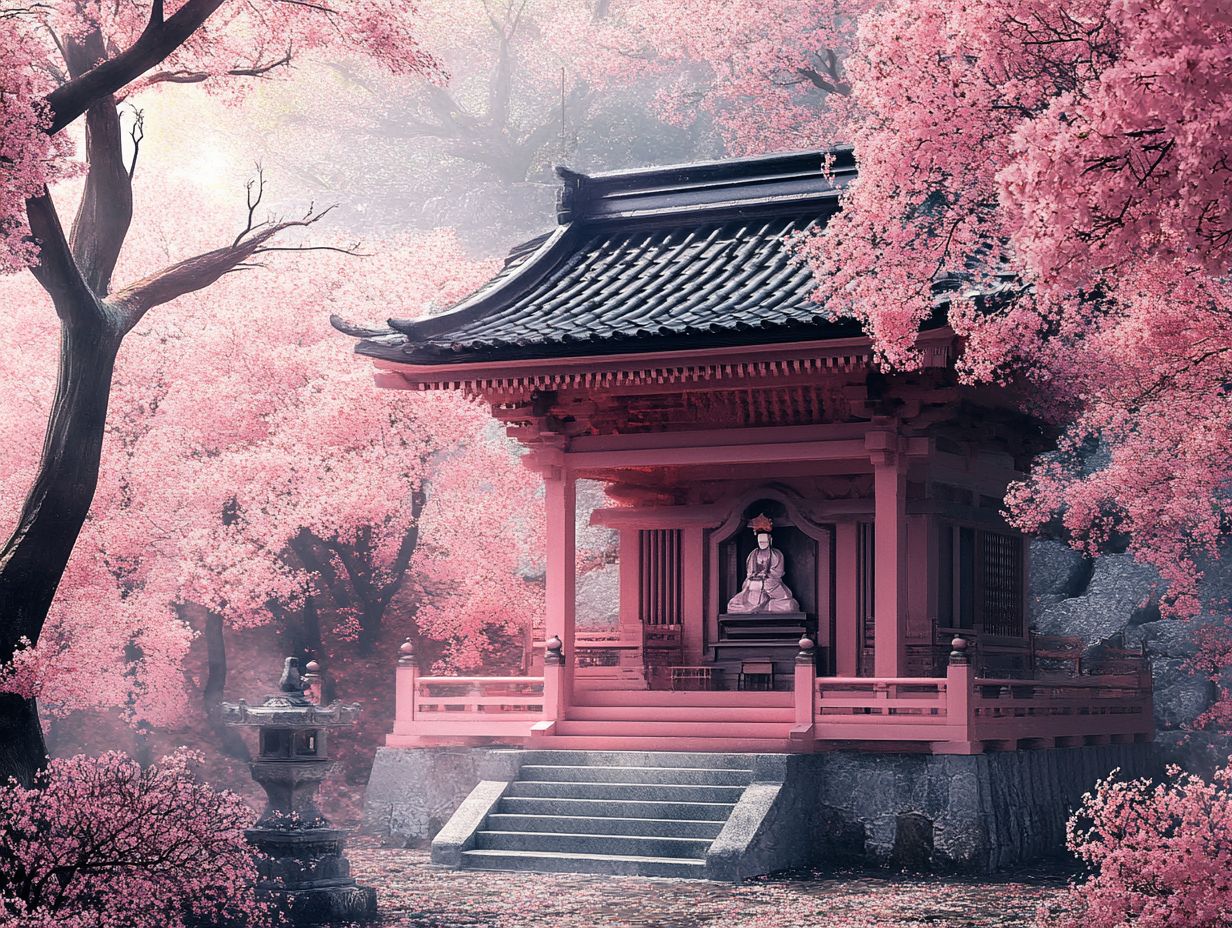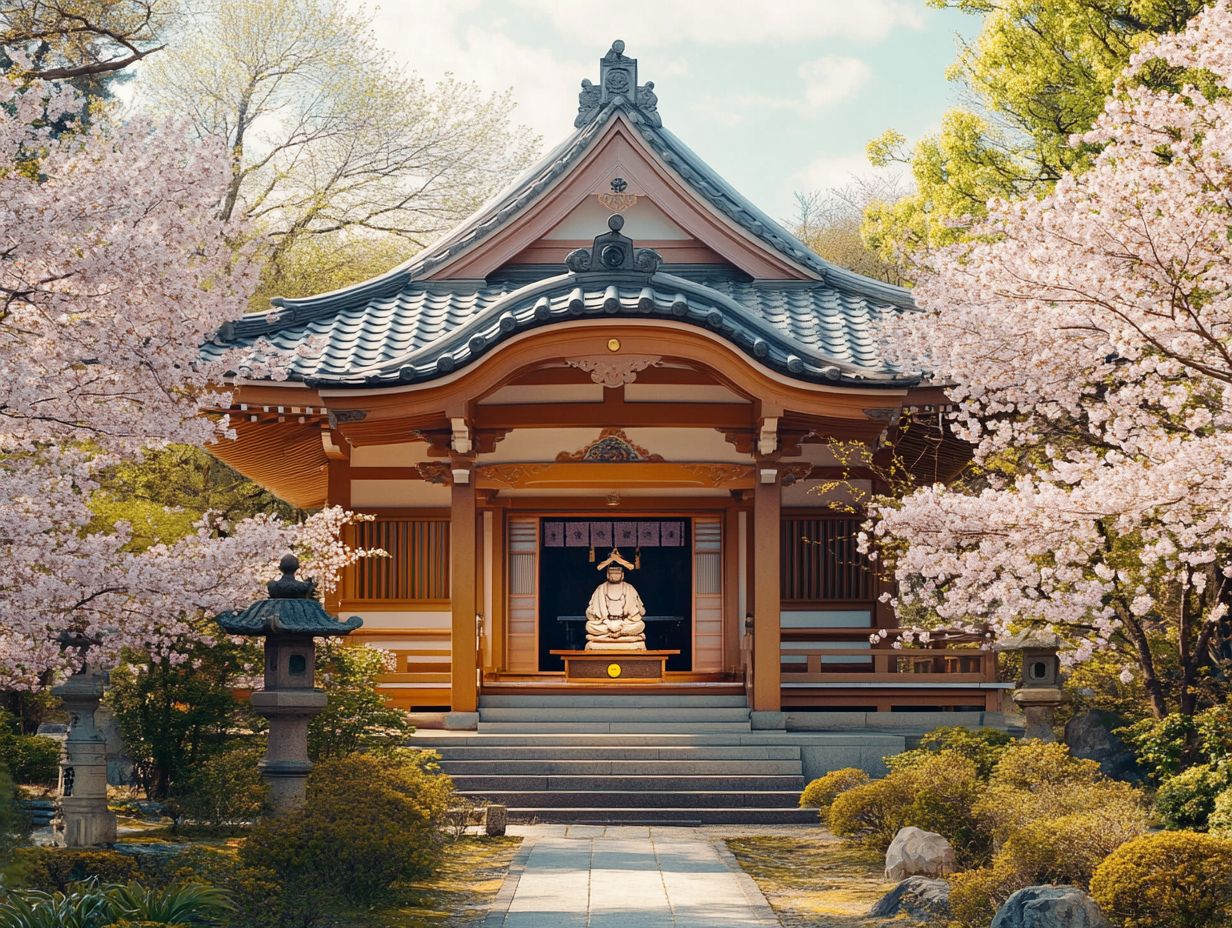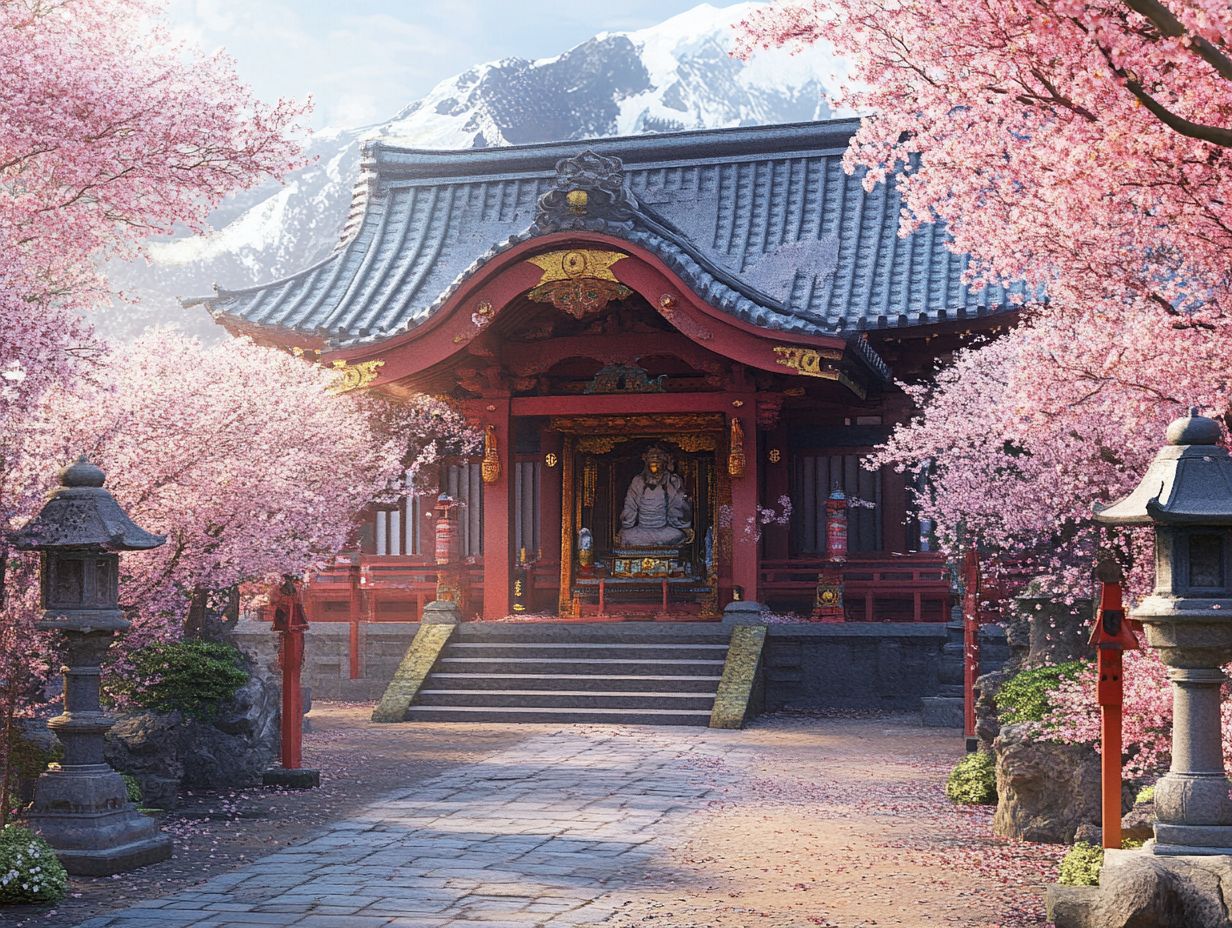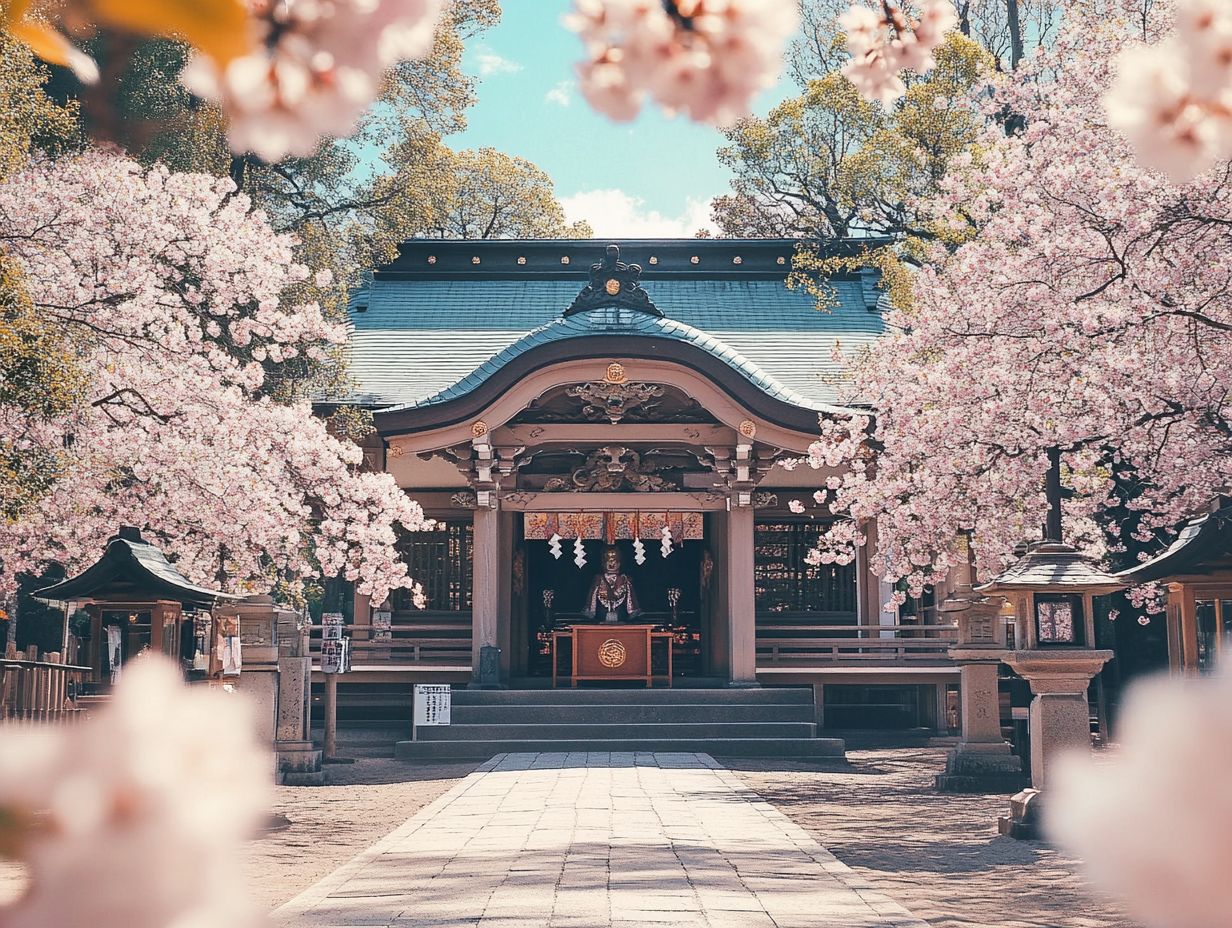Does Japan Follow Hinduism?
Hinduism, recognized as one of the world’s oldest religions, possesses a fascinating yet frequently overlooked history in Japan. This exploration delves into the intriguing arrival of Hinduism and its subtle yet significant influence on Japanese culture, illustrating how it has intricately woven itself into the fabric of Japanese society.
The current status of Hinduism in Japan is noteworthy, encompassing the number of practitioners, significant temples, and unique forms of practice that have emerged over time, reflecting the rich spiritual heritage and multiculturalism within the religious landscape. This discussion will also shed light on the similarities and differences between Hindu beliefs and Japanese religious traditions, emphasizing the profound impact Hinduism has had on Japan’s arts, philosophy, spiritual practices, and cuisine.
Through this examination, one can discover the rich interplay between these two vibrant cultures, their enduring legacy, and the profound impact of cross-cultural influences and religious syncretism.
History of Hinduism in Japan

The history of Hinduism in Japan presents a complex tapestry intricately woven from centuries of cultural exchange, migration, philosophical discourse, and interfaith dialogue. This narrative began as early as the 6th century, when Indian merchants and travelers first introduced elements of Hindu beliefs, sacred texts, and practices to the archipelago.
Throughout this historical journey, the intertwining of Hinduism with other spiritual traditions, particularly Buddhism, Shinto, and indigenous beliefs, becomes evident, underscoring the significance of religious syncretism in shaping the unique religious identity that characterizes Japan today.
This identity is marked by a rich array of customs and festivals that draw from Indian cultural heritage.
How and When Did Hinduism Reach Japan?
Hinduism made its way to Japan through a series of cultural exchanges that began in the 6th century, primarily facilitated by Indian traders and Buddhist missionaries who journeyed to the island nation, bringing with them a wealth of cultural heritage and spiritual teachings.
As these early interactions unfolded, Japanese society was introduced to a variety of concepts and practices, including meditation and sacred rituals, that laid the foundation for future spiritual development. The influence of notable figures such as Bodhidharma, credited with transmitting key elements of Zen Buddhism, intertwined with Hindu philosophies, particularly those emphasizing meditation, moksha, and mindfulness.
The migration of ideas, symbols, narratives, and philosophical teachings from India through trade and cultural exchange led to the gradual integration of Hindu elements into Japanese customs and religious practices. This ongoing dialogue not only enriched Japan’s spiritual landscape but also fostered a distinctive blend of Hindu and Buddhist beliefs, contributing to the religious diversity and tolerance that would resonate across the ages.
What Influence Did Hinduism Have on Japanese Culture?
The influence of Hinduism on Japanese culture manifests in various dimensions, encompassing mythology, folklore, artistic expressions, and spiritual practices. This interplay of beliefs significantly shapes Japan’s distinctive cultural identity.
This intricate relationship is particularly evident in the narratives of deities and spirits, where figures from Hindu mythology resonate within Japanese traditions, blending with local folk beliefs and indigenous spiritual practices. Traditional arts, including painting, sculpture, and religious symbols, often incorporate Hindu motifs, enriching Japan’s artistic legacy with layered meanings. Moreover, elements of Hindu philosophy infuse the spiritual dimensions of Japanese practices, as reflected in the meditative approaches found in both Buddhism and Shintoism, emphasizing dharma, karma, and the pursuit of enlightenment.
Festivals celebrated across Japan further illustrate this cultural fusion, drawing upon the vibrant energies and rituals characteristic of Hindu festivities, including Diwali and Holi. In doing so, these occasions enhance communal experiences, imbuing them with a profound sense of spirituality that resonates deeply within the collective consciousness.
Current Status of Hinduism in Japan
Hinduism occupies a distinctive place in Japan, characterized by a small yet vibrant community that diligently practices its faith within a predominantly Buddhist and Shinto environment, reflecting religious tolerance and spiritual diversity.
This dynamic coexistence reflects the nation’s rich tapestry of spiritual traditions, ethical values, and its commitment to religious pluralism.
How Many Hindus are There in Japan?
The Hindu population in Japan is estimated to be between 30,000 and 50,000 individuals, comprising a diverse blend of expatriates from India and Nepal, along with an increasing number of Japanese individuals who are embracing the faith. This community is distinguished not only by its size but also by the rich tapestry of cultural backgrounds, traditions, and practices that reflect their countries of origin.
Migration patterns over the decades have given rise to a vibrant Hindu community, particularly in urban centers such as Tokyo and Osaka. Many members of this demographic maintain strong connections to their heritage through festivals, religious observances, educational initiatives, and cultural rituals.
As immigrants continue to arrive, Japan’s religious landscape has experienced nuanced transformations, fostering increased cultural exchange and awareness. This evolution promotes a deeper understanding of Hinduism among the Japanese populace, enriching the societal fabric of the nation.
What are the Major Hindu Temples in Japan?

Major Hindu temples in Japan, including the Shree Sanatan Hindu Union Temple in Tokyo and the Sri Ganesh Temple in Osaka, serve as remarkable testaments to the architectural elegance and profound spiritual significance of Hindu traditions within the Japanese context.
These sacred spaces not only display intricate carvings and vibrant colors that echo traditional Indian architectural styles, but they also cultivate a lively community atmosphere where rituals and ceremonies are performed with heartfelt devotion. Visitors and worshippers partake in a variety of ceremonies, embodying the deep spiritual practices intrinsic to Hinduism, ranging from daily prayers to grand celebrations.
The temples function as cultural hubs, uniting diverse groups who engage in yoga classes, meditation sessions, and community events, thereby enriching their understanding of spirituality while preserving a rich heritage within a uniquely blended cultural landscape.
How is Hinduism Practiced in Japan?
Hinduism finds its expression in Japan through a tapestry of rituals, prayers, and community gatherings, encompassing traditional ceremonies, worship services, and the celebration of significant festivals that honor the faith’s rich spiritual heritage and cultural integration.
This vibrant manifestation of spirituality often unites individuals from varied backgrounds, all sharing a profound appreciation for the traditions deeply rooted in Hindu teachings. One can witness devotees engaged in puja, or worship rituals, where offerings of flowers and incense are made, cultivating a sense of devotion and connection to the divine, reflecting the profound spirituality in daily life.
Community events such as Diwali and Holi not only signify the changing of seasons but also foster social bonding, cultural exchange, and a deep sense of community among participants. The importance of these festivals transcends mere celebration; they play a crucial role in reinforcing the community’s identity and upholding the values of love, compassion, and harmony that lie at the heart of Hindu philosophy and traditions.
Similarities and Differences between Hinduism and Japanese Religion
The examination of the similarities and differences between Hinduism and Japanese religions particularly Shinto and Buddhism unveils a rich tapestry of interwoven beliefs. This intricate landscape is marked by a mutual reverence for spirituality and ethical principles, while simultaneously showcasing unique practices, diverse pantheons, and different deities that distinctly shape the identity of each faith.
Similarities: Beliefs and Practices
Hinduism and Japanese religions exhibit several fundamental beliefs that resonate deeply, encompassing concepts of spirituality, ethics, nature worship, and a profound reverence for nature, all of which are elegantly reflected in their respective rituals and community practices.
Both belief systems underscore the interconnectedness of all living beings, emphasizing the significance of community in nurturing spiritual growth, social structure, and communal worship. This connection is vividly illustrated through their communal rituals, which not only embody expressions of faith but also serve as vital opportunities for social bonding.
For example, the importance of offerings in their ceremonies stands out, showcasing a profound respect for the natural world and its resources. The moral principles that guide adherents within these traditions advocate for harmony and coexistence, further reinforcing a shared understanding of ethical living as a pathway to spiritual enlightenment and religious tolerance.
Differences: Deities and Rituals
Hinduism is characterized by a rich pantheon of deities, including prominent figures like Vishnu, Shiva, and other deities, while Japanese religions predominantly center around kami, the spirits tied to natural elements. This distinction creates a notable contrast in their respective ritual practices.
Hindus partake in elaborate ceremonies, such as puja, to honor their gods through offerings and chants, engaging in intricate rituals designed to maintain cosmic balance and nurture a personal connection with the divine. Conversely, practitioners of Shinto and other Japanese belief systems often engage in more understated rituals that prioritize purity and the reverence of nature. This is exemplified by their visits to shrines, where they pay homage to the kami associated with specific localities.
Such differences not only underscore the diversity in worship methods but also reflect distinct worldviews that shape community interactions and individual spirituality. This makes the exploration of these religions particularly compelling, inviting a deeper understanding of their unique practices and beliefs.
Impact of Hinduism on Japanese Society

The influence of Hinduism on Japanese society is profound, weaving its way through various aspects of life such as art, literature, philosophy, and even culinary traditions, thereby enhancing the cultural tapestry of the nation.
Arts and Literature
Hinduism has profoundly impacted Japanese arts and literature, with elements from Hindu mythology seamlessly woven into traditional Japanese narratives, paintings, and performances. This remarkable cross-cultural interaction has enriched both traditions in unique and meaningful ways.
One can observe this cultural blending in the adoption of various mythological motifs, particularly the figure of Avalokiteshvara, who frequently appears in art forms such as Noh and Kabuki theater. In these performances, the transcendent qualities of compassion and mercy tied to this bodhisattva resonate deeply with audiences, reflecting themes found in Hindu epics.
Moreover, the intricate designs present in Japanese textiles and ceramics often showcase Hindu-inspired deities and iconography, highlighting how artistic expressions serve as a vital bridge between these two rich cultures.
Literature, too, has felt the effects of this influence, as narratives inspired by Hindu tales have subtly interwoven into the fabric of Japanese storytelling, enhancing the narrative depth and thematic complexity across generations.
Philosophy and Spirituality
The philosophical teachings of Hinduism resonate profoundly within Japanese spirituality, particularly through concepts such as karma and dharma, which parallel the ethical tenets found in Zen Buddhism and Shinto practices. These ideas underscore the importance of personal responsibility and moral conduct, shaping the ethical frameworks that guide individuals in their daily lives.
This intricate intertwining of beliefs fosters a rich dialogue between cultures, allowing the influence of Hindu thought to manifest in the ways Japanese practitioners embrace compassion and interconnectedness. As individuals engage with these teachings, they often discover that the principles of balance and harmony, intrinsic to both traditions, cultivate a deeper understanding of human existence and ethical living.
Ultimately, such cross-cultural exchanges enhance spiritual practices and promote a more holistic perspective on morality, resonating across diverse communities and enriching the fabric of human experience.
Food and Cuisine
The influence of Hinduism on Japanese cuisine is evident in the adoption of vegetarian principles and the celebration of specific festivals that emphasize the significance of certain food offerings within both cultural landscapes.
This culinary connection illustrates how shared values such as purity, reverence for nature, and spiritual significance have transcended geographical boundaries. Notably, the emergence of vegetarianism in Japan can be traced back to Hindu dietary practices, inspiring various regions to embrace plant-based dishes devoid of meat and fish.
During festivals like Matsuri, food offerings reflect the ritualistic elements found in Hindu celebrations, where dishes are meticulously prepared as offerings to honor deities. This blending of traditions not only enriches the tapestry of Japanese cuisine but also cultivates a deeper appreciation for the cultural narratives that are intricately woven into each meal.
Summary of Key Points
Hinduism’s historical and contemporary influences on Japan encompass a multifaceted array of dimensions, including its significant impact on culture, spirituality, and society. This interplay highlights a distinctive blend of beliefs and practices that enrich the Japanese spiritual landscape.
The interaction between Hindu traditions and local Japanese customs has fostered a unique fusion evident in various art forms, festivals, and philosophical concepts that prevail in the region. This cross-cultural exchange has facilitated the introduction of diverse spiritual practices, contributing not only to communal harmony but also to social cohesion.
By weaving elements of Hindu philosophy, such as karma and dharma, into the fabric of Japanese thought, its relevance continues to persist, offering valuable insights that resonate with contemporary societal challenges. Ultimately, this enduring connection signifies a rich tapestry of shared values that continues to inspire and guide many lives in Japan today.
Final Thoughts

Final reflections on the role of Hinduism in Japan unveil a rich tapestry of cultural significance and spiritual depth, illustrating how this ancient religion continues to resonate profoundly within the modern Japanese context.
The influence of Hindu beliefs and practices is intricately woven into various facets of Japanese culture, manifesting in art, architecture, literature, and festivals. Elements such as Hindu deities and motifs have subtly intermingled with local traditions, thereby enriching Japan’s spiritual landscape. As individuals delve into these connections, they often find themselves captivated by the philosophical tenets of Hinduism, which emphasize concepts like karma and dharma, thereby shaping personal and societal ethics.
This integration fosters a unique dialogue between the two cultures, cultivating an atmosphere of mutual respect and understanding. Ultimately, Hinduism’s presence in Japan serves as a bridge between ancient wisdom and contemporary life, prompting individuals to reflect on their own spirituality and cultural identity while underscoring its enduring significance.
Frequently Asked Questions
Does Japan follow Hinduism?
No, Japan does not follow Hinduism as its primary religion. The majority of the population in Japan follows Shintoism and Buddhism.
Is there any presence of Hinduism in Japan?
Yes, there is a small presence of Hinduism in Japan. It is estimated that there are around 30,000 Hindus living in Japan.
How did Hinduism come to Japan?
Hinduism first came to Japan through trade and cultural exchange with India. In the 8th century, the Japanese Emperor Shomu invited Indian priests to Japan to spread the teachings of Buddhism, which had strong ties to Hinduism.
Are there any Hindu temples in Japan?
Yes, there are a few Hindu temples in Japan. The most well-known one is the Venkateswara Temple in Hiroshima, which was built in 1981 by the Hindu community living in Japan.
Are there any Hindu festivals celebrated in Japan?
Some Hindu festivals, such as Diwali and Holi, are celebrated by the small Hindu community in Japan. However, these festivals are not widely recognized by the general public in Japan.
Do the Japanese people have any knowledge about Hinduism?
While the Japanese people may have some basic knowledge about Hinduism through cultural exchange and media, it is not a well-known or practiced religion in Japan.
